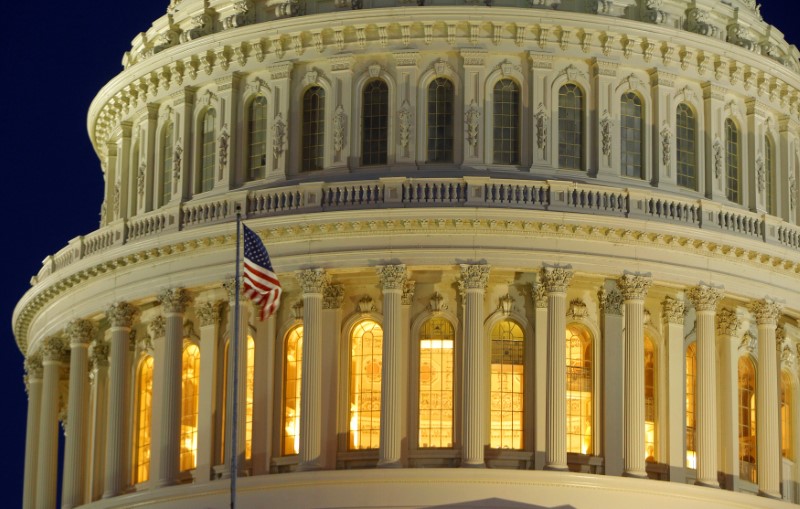By Richard Cowan and Ginger Gibson
WASHINGTON (Reuters) - The U.S. Congress, bitterly divided for years along party lines, may be mapping a bipartisan path forward that skirts around President Donald Trump when he refuses to engage constructively with lawmakers, Democrats and some lobbyists said on Monday.
The path was discernible in a nearly $1.2 trillion federal spending deal carved out over the weekend to avert a government shutdown. It had Democratic fingerprints all over it, even though Republicans control Congress and the White House.
White House budget director Mick Mulvaney said Trump will sign the 2017 budget bill when he receives it from Congress on Thursday or Friday. Trump, in an interview with Bloomberg on Monday, said he was "very happy" with the deal announced late on Sunday.
Democrats claimed victory on issue after issue in the agreement, which will keep the lights on in Washington through the end of the federal fiscal year on Sept. 30, provided it holds up and wins final approval as expected.
Trump scored a partial win, getting a commitment for up to $15 billion in additional funding for a military buildup. That was about half of what he originally asked for.
No money was included for Trump's proposed U.S.-Mexico border wall. Democratic opposition to it was solid and support from Trump's fellow Republicans was soft. Mulvaney said Trump will seek wall funding in a budget proposal coming in late May.
At a White House briefing, Mulvaney defended the concessions Trump made to reach an agreement, saying Democrats gave up on some items they had wanted as well in order to find a compromise.
"Everything we got in this deal ... lines up perfectly with the president's priorities," he said.
Democrats took an opposite view.
Describing the work on Capitol Hill that went into the temporary spending pact, Senate Democratic leader Chuck Schumer told reporters: "Democrats and Republicans in the House and Senate were closer to one another than we were to the president on so many of the different issues."
Schumer and Senator Patrick Leahy, the senior Democrat on the Appropriations Committee, said they were bolstered in negotiations by the fact that several Republican senators opposed funding for Trump's wall and his call for deep domestic spending cuts.
Schumer and Leahy said the White House never tried to work with Democrats in the process.
Trump treats engaging with lawmakers on legislation as “an afterthought," said Doug Heye, a Republican strategist who worked in Congress as an aide to former House Republican leader Eric Cantor.
“The power of the Oval Office can provide a lot of leverage when trying to move something on Capitol Hill," Heye said. “We just haven’t see that level of engagement from Trump, whether it’s healthcare, or building a wall, or tax reform.”
But John Feehery, a Republican strategist in Washington, said the spending bill may not be indicative of Trump’s ability to negotiate with Congress because the legislative body should have dealt with this year’s funding months ago and never have been allowed to go into the current year.
“He knows that this bill was probably not going to reflect his priorities because it was old business,” Feehery said. “When it comes to new business, he has a lot more leverage in getting his priorities accomplished.“
PLANNED PARENTHOOD, OBAMACARE FUNDED
The spending deal preserved funding for healthcare provider Planned Parenthood, which has drawn Republican ire because it performs abortions; for the Obamacare healthcare law; and for an array of environmental and other domestic programs Trump wanted to slash.
White House spokesman Sean Spicer said because the legislation needs to win a supermajority of 60 votes in the 100-member Senate that cannot be achieved without Democratic support, "we couldn't have our entire way" on the deal.
Spicer said the "president's priorities will be reflected much more" in spending yet to be worked out for the 2018 fiscal year that begins on Oct. 1. He said Trump was pleased to see the increase in military spending, a "down payment" on border security and money for scholarships to help low-income children in Washington attend private schools.
The fiscal 2017 funds, which should have been locked into place seven months ago, would pay for federal programs from airport and border security operations to soldiers' pay, medical research, foreign aid, space exploration and education.
The Pentagon would win a $12.5 billion increase in defense spending for the fiscal year, with the possibility of an additional $2.5 billion contingent on Trump delivering a plan to Congress for defeating the Islamic State militant group.
Congressional negotiators settled on $1.5 billion more for border security, including money for new technology and repairing existing infrastructure.
Under the deal, Puerto Rico would get an emergency injection of $295 million for its Medicaid health insurance program for the poor. The impoverished U.S. territory faces a severe Medicaid funding shortfall.
The U.S. government and coal companies would be required to pay out healthcare to retired coal miners, guaranteeing benefits to workers even as coal companies face bankruptcy, under the spending agreement.
The deal also would reimburse New York City for money spent securing Trump and his family at Trump Tower in Manhattan.
